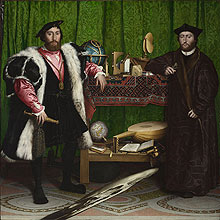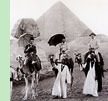Britain's relationship with the
Middle East in the 1800's
The British and Ottoman empires relationship to each other for most of the nineteenth century could best be described as cautious and diplomatic. Successive British governments in that century were reluctant to directly interfere in the Middle East unless British interests were under threat.
A good example of this was when Napoleon briefly invaded Egypt from 1798-1801, the British fleet assisted the Ottomans by sinking the French fleet off the coast of Egypt. This was more a case of Britain not wanting France to establish colonies in North Africa rather than any real affection for the Ottomans.
Britain would again join forces with the Ottomans in 1854-56 to fight the Crimean War against Russia. Britain this time was worried about Russia taking territory from the Ottomans in Eastern Europe. Such alliances were the first time in history that Muslim and Christian empires came together to battle other Christian states for political ends. During the Crimean War there was outrage in certain sections of the British press that the country had joined forces with the 'infidel Turks' to fight fellow Russian Christians.
Britain's favourite colony
At the heart of Britain's concerns was its colony of India. By the second half of the nineteenth century all of India was under the control of the British Empire.
Queen Victoria was proclaimed 'Empress of India' in 1876 by the British Prime Minister of the day Benjamin Disraeli. Britain was at the height of the industrial revolution and its trade with India, particularly in cotton, was powering this success. No-one, be they Muslim or Christian was going to be allowed to interfere with this arrangement. Therefore, the Middle East as a gateway to India via land or sea was a very important region of the world for Britain.
The Impact of Merchants and Commerce

Since the 1400s the Ottoman Empire had allowed European merchants to trade within its borders. Some of the earliest 'Turkey carpets' imported to Britain can be seen in a painting called 'The Ambassadors by Hans Holbein. The carpets in this painting had been in the possession of King Henry VIII.
By the end of the nineteenth century European companies and merchants were dominating international trade in the Middle East. This had a devastating effect on the Ottoman Empire and the region generally. The merchants who were predominantly British, French and Russian exported the raw materials of the region to Europe. Cotton was exported from Egypt, wool from Syria, with different types of foodstuffs such as oranges, olive oils and wines from Algeria and Tunisia. Europe would then import finished products like textiles and clothing back into Middle Eastern countries and profit from these sales. Local manufacturers could not compete with the foreign companies.
The Cotton Trade
Egypt and its cotton production became increasingly important for British trade when the American Civil War broke out from 1861-5. With the freeing of the slaves in the southern United States, supplies of cotton stopped coming across the Atlantic into the ports of Liverpool and Manchester. Egyptian cotton therefore took its place and was shipped back to the industrial factories of northern England to be transformed into clothing for re-sale to the rest of the world. As more and more land in Egypt was given over to cotton growing for export, local people were forced off the land. The sultan in Istanbul and his governors throughout the Empire were not only aware of the dominance of European trade but actively encouraged it. They were eager to follow Europe's success in the Industrial Revolution and borrowed huge loans from British and French banks to achieve this. The governor of Egypt Ismail Pasha stated in 1879 'My country is no longer in Africa; we are now part of Europe. It is therefore natural for us to abandon our former ways and to adopt a new system adapted to our social conditions'. It is doubtful that the vast majority of the Egyptian people agreed with him.
The British Invasion of Egypt, 1882

In 1869 Egypt officially opened the Suez Canal. Built with Egyptian and French money, the canals opening was a major world event in the nineteenth century. However, the Egyptian government had borrowed heavily from foreign countries to assist Egypt's technological development. By 1876, Egypt was unable to make its international repayments and in order to pay these debts it sold its shares in the Suez Canal to Britain. The Egyptian population became increasingly disillusioned with how the country's finances were being handled and were angered by the undermining power of Western financial systems. Britain became worried that the Ottoman supported rulers would be overthrown in a coup and therefore invaded Egypt in 1882.
Britain claimed its intervention was necessary to maintain law and order. Egyptians believed it was more to do with the British protecting their financial interests and taking control of the Suez Canal.
As the nineteenth century came to a close, it became obvious to inhabitants of North Africa and the Middle East that European powers were slowly colonising their countries both economically and militarily.

Documents and Sources
>Letter from Leighton
> Letter to Leighton
> Leighton's Tangiers
> Empire and Travel Map
> Collecting Map
> La Zisa Palace
> Leighton's Paint Box

 Who ruled the Middle East in Leighton's time?
Who ruled the Middle East in Leighton's time? Where did Leighton travel to?
Where did Leighton travel to? What did Leighton collect during his travels?
What did Leighton collect during his travels?